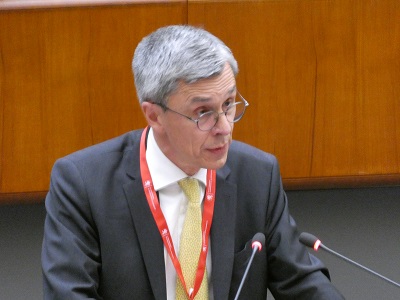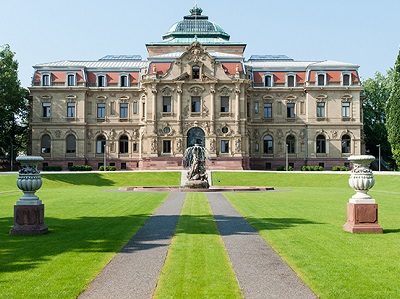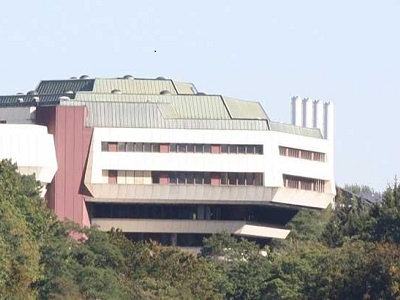Klaus Grabinski, the man without bias
Klaus Grabinski was the patent community's preferred candidate for the presidency of the UPC's Court of Appeal. In this role, he is also its most prominent face. Now Grabinski must ensure uniform case law and, after the court's difficult birth, a quiet first year. Yet the German judge is first and foremost motivated by ruling on patent cases.
5 June 2023 by Mathieu Klos
“The Unified Patent Court is represented by the president of the Court of Appeal,” reads the UPC website. Since last October, Klaus Grabinski has had a demanding role, which includes new diplomatic skills, for which the German judge never trained.
Grabinski put these diplomatic skills into practice during his UPC inauguration opening speech at the Hémicycle, Luxembourg. The building on Luxembourg’s Kirchberg, not far from the CJEU, is the seat of the UPC Court of Appeal. It was here that the European patent community celebrated the opening of the new international court. Luxembourg prime minister Xavier Bettel was in attendance, as was German minister of justice Marco Buschmann. Other UPC countries also sent high-ranking representatives to Luxembourg; many others who helped construct the UPC came to celebrate the new court as a milestone of European integration.
Grabinski also expressed his happiness that after so many years of countless difficulties, things are finally getting underway. As a member of the preparatory team, he has personally experienced most of the hurdles that set back preparations for the European patent court over the past 15 years or longer.
Grabinski makes his point
But the German judge’s opening speech was not without a few critical words – not for his favourite court, but for the EU Commission. At the beginning of May, the commission presented a proposal for the regulation of standard essential patents in Europe. Some observers suggest this could pose a threat to the UPC.

Klaus Grabinski
Grabinski expressed concerns that the regulation is not currently compliant with the EU Charter of Fundamental Rights. He is concerned that SEP owners would have to register their patents at the EUIPO before they could bring an infringement action at the UPC.
In the run-up to the UPC’s launch, experts claimed SEP lawsuits are likely to make up a large part of proceedings in the first few months. The court is considered particularly attractive to SEP holders because of its ability to issue an injunction for at least 16 EU countries. The commission’s current plans are likely to make SEP lawsuits at the UPC much more difficult.
In his opening speech, Klaus Grabinski was confident in his criticism of the EU Commission in attendance while demonstrating a typical Rhineland sense of humour. He is sure, Grabinski says with a small, wry smile, that the plans of the commission will be fully compliant with fundamental rights once they have passed through the EU legislation.
Imbued with Rheinland spirit
Grabinski’s appointment as the UPC’s top representative looks like a dream come true for the judge, even though he himself says, “My commitment to the UPC always came through the issue itself. My attitude was more, if it happens, then great, because it advances European patent law. If not, then it’s bad for European patent law but not the end of the world for myself.”
Nevertheless, in recent years the Rhineland native was one of the preparation team’s most high-profile faces.
On 6 February 1962, the future UPC Court of Appeal president was born in Viersen, a small town which lies on the German border with the Netherlands. It is also close to Belgium. The month of February is when people in the Rhineland celebrate carnival, a time of good cheer and for poking fun. Thus, Rheinlanders are known for their mocking humour and ability to celebrate on a given occasion.

Federal Court of Justice ©BGH_p_palaismitBrunnen_jpeg.jpg
Aside from his other interests, which include listening to music and an enjoyment of climbing mountains, the 61-year-old can reflect on 30 years of experience in patent infringement litigation. In the 1980s, Grabinski started out studying law at the universities of Trier, Geneva and Cologne before the Regional Court Düsseldorf appointed him as a judge in 1993. He then became presiding judge of one of the court’s well-regarded patent chambers, prior to his appointment as patent judge at the Federal Court of Justice’s patent senate in 2009. Here, he dealt with both patent infringement cases and revocation cases under the German bifurcation system.
During his time at the Federal Court of Justice, he was involved, among other things, in the famous “heat exchanger” decision. In 2021, the German government took this as an opportunity to amend the German Patent Act and to give judges more discretion in automatic injunctions in the event of hardship.
In from the beginning
Between 2009 and 2022, as a member of the Federal Court of Justice, Grabinksi sought to increasingly raise his profile for the UPC. But back in the 1990s, he was already involved in the UPC at a very early stage. “I more or less grew into the subject of the European patent court over the years,” says Grabinski. At this time, Düsseldorf’s judges were invited to participate in an international patent conference. However, according to Grabinski, none of the more senior colleagues felt called upon to be on a panel held in English.
“Over the years, I grew into the subject of the European patent court”
He continues, “That’s when I took over as a young judge. I met the two patent greats Hugh Laddie and Jan Brinkhof, who impressed me personally. It was a pleasure for me to have discussions with European judge colleagues across borders.” Later, the German Ministry of Justice and the EU Commission appointed the Düsseldorf judge to various expert commissions to prepare the Unified Patent Court and its various previous iterations.
From the mid-2000s, Grabinski was a constant participant in preparatory meetings for the new court. From 2009 onwards, work picked up speed. Grabinski participated in the drafting of the UPC Agreement, and in negotiations for the Rules of Procedure.
Over the years, he never tired of promoting the court – even when constitutional complaints in Germany meant the project was in danger of failing at the last hurdle. While Grabinski, former Swedish judge Alexander Ramsay and the German official Johannes Karcher were the official representatives for the new court, Grabinski concentrated on the legal functions. In the last three years, he was probably the only sure-fire contender for the job as president of the Court of Appeal.
Trusted German quality
Back in 2017, the patent community already considered Klaus Grabinski a top candidate for the presidential position. At that time, participants, and not only from Germany, voted him the top favourite for president in JUVE Patent’s first international survey.
Furthermore, the latest JUVE Patent survey in 2022 came to the same result. JUVE Patent readers wanted to see the German judge as head of the Court of Appeal, unarguably the most important job at the UPC. In total, 28.5% of participants voted for Klaus Grabinski. Many of the UPC’s future users considered him to be “simply the best candidate”, as described by one survey participant.

Another says he is “an excellent and very experienced judge with great English skills”, while one participant describes him as “one of the most important people for the UPC, well-connected” and praises his “international focus”.
“Grabinski is an excellent and very experienced judge with great English skills”
There is also a great deal of respect in some of the survey responses. One participant writes, “Keen mind, he asks very sharp questions in proceedings.” Users of the UPC expect him, together with his six Court of Appeal colleagues, to ensure uniformity in the administration of justice. They must also keep a close eye on the legal quality of the local, regional and central divisions.
Balanced approach
The market harbours no doubts as to his legal abilities. “Klaus Grabinski is difficult to get a hold on as a judge. He doesn’t have a definitive stance; I’ve always found him very balanced in patent cases,” says one patent lawyer. “He just wants the case to be decided.”
Another German patent lawyer says, “His neutral stance is good for his new job as head of the Court of Appeal. I have the impression that he also gets along very well with Rian Kalden.” Kalden is the presiding judge of the second chamber at the Court of Appeal.
About himself, Grabinski says, “I see myself neither as patent-owner friendly nor as patent-hostile. For me, the central question in the proceedings has always been how the patent should be interpreted. It is crucial that we patent judges reach a conclusion on this that we can defend well. What consequence results for one party or the other is secondary.”
“I am neither patent-owner friendly nor patent-hostile… the central question is how the patent should be interpreted”
Thus, not much ruffles Grabinski. So far, he has presented himself as a calm but attentive observer. His eyes always watch his counterpart; before he says anything, his brain noticeably whirs for a moment. Only then do well-considered sentences pass his lips, with these utterances rarely thoughtless. But that is how it should be for the first president of the UPC.
Lawyers and company representatives need to have a hard time guessing in which direction Grabinski will take their case.
First representative of the UPC
It will be some time before the Court of Appeal receives its first appeal cases. At the moment, Grabinski’s role mostly centeres on giving the new court a face, promoting trust among users, and helping the UPC to succeed.

UPC Court of Appeal in Luxembourg ©UPC
But the difficult preparatory phase, in which the court project had to endure severe setbacks, has shown that users’ approval is fleeting. The negative opinion of the CJEU in 2011, the consequences of Brexit in 2016 and, from 2017, the delays caused by the two constitutional complaints in Germany, mean user euphoria was not always as high as in the final weeks before the UPC launch.
In particular, the days around the launch showed that Grabinski still has much convincing to do. Users complained on social media about slow opt-out registration as the court’s CMS system seemed to reach its limit in the face of mass transmissions of applications. Lawyers also complained that a previously announced test phase of the court system did not take place this week and that not all features of the CMS were operational on launch day.
A judge first and foremost
Originally, Grabinski had toyed with the idea of becoming a diplomat in the service of the Federal Republic of Germany. But then he decided to pursue a career in law.
In Grabinski’s career as patent judge, the legal aspects were always primary. “As judge at the Federal Court of Justice I was mainly interested in the legal components of the new job at the UPC,” Grabinksi says. “But of course I am also happy to take on the organisational and diplomatic challenges that this entails.”
Nonetheless, he seems to harbour a certain basic diplomatic disposition. The more Grabinski has moved into the spotlight of the global patent community in recent years, the more statesmanlike he has become. His calm and even-tempered manner inspires confidence in the patent community.
“We need a reasonable amount of cases to be able to develop good jurisprudence”
But the boss now has internal work to do. He has to merge the 85 or so judges from many different EU countries into a real team to make the court a success as the first supranational civil court. With a certain amount of competition between individual local divisions, the ambitions of the German, French, Italian and Dutch chambers in particular are high.
But for now, Klaus Grabinski’s main wish is that “we don’t get another major deadlock and that we get a reasonable amount of cases to be able to develop good jurisprudence”.

